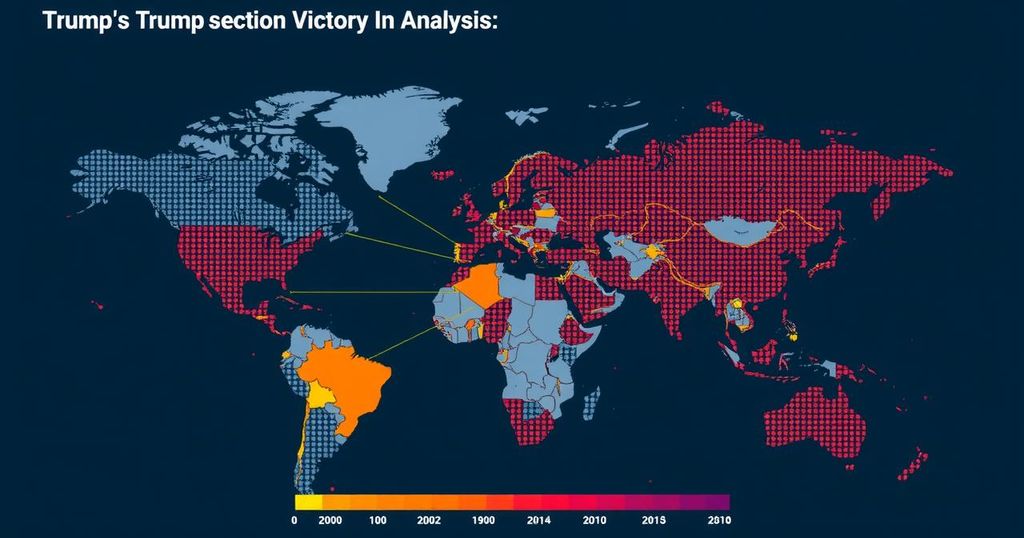What Trump’s Second Presidency Could Mean for Global Relations

Donald Trump’s return to the White House suggests substantial shifts in U.S. foreign policy, with implications for Ukraine, the Middle East, and China. His approach may include facilitating peace negotiations in Ukraine, maintaining a strong alliance with Israel while addressing Middle Eastern tensions, and adopting a confrontational trade stance towards China. These developments could reshape global dynamics and alliances.
The implications of Donald Trump’s second potential presidency promise a significant transformation in United States foreign policy amidst ongoing global turmoil. Trump’s campaign reiterated the principle of ‘America First’, suggesting a restrained approach towards international conflicts and a focus on domestic interests. His previous record from 2017 to 2021 provides insight into his likely strategies regarding pivotal matters involving Russia and Ukraine, the Middle East, and China. In the context of Russia and Ukraine, Trump asserted his capability to resolve the war within a day, although details regarding his strategy remain vague. According to a paper by his former national security advisers, continued U.S. support for Ukraine would be conditional on diplomatic negotiations with Russia, proposing a delay in Ukraine’s NATO membership as an incentive. This stance raises concerns among Democrats, who regard it as a capitulation that risks European security. Despite skepticism surrounding NATO, his intentions regarding U.S. membership remain ambiguous, leaving leaders within the alliance apprehensive about future commitments. Regarding the Middle East, Trump has expressed intentions to restore peace, attributing the escalation of violence to Biden’s policies. His administration previously took a hardline stance against Iran while building a closer bond with Israel, actions which critics argue have contributed to regional instability and alienated Palestinians. Trump’s approach included the controversial decision to relocate the U.S. embassy to Jerusalem and broker the Abraham Accords, which normalized ties between Israel and several Arab states, yet sidelined Palestinian aspirations for statehood. His strategy going forward will be crucial in addressing the ongoing conflicts in Gaza and Lebanon while balancing support for Israel and regional diplomacy. On the issue of China, Trump’s administration was marked by a confrontational stance, labeling China a strategic adversary and initiating a trade war through tariffs. While President Biden maintained some of these policies, Trump’s return may signal a shift towards a more aggressive posture, especially regarding Taiwan. His assertion that he could deter Chinese aggression without military force due to his unpredictable nature complicates future diplomatic relations and strategies in the Asia-Pacific region. Overall, Trump’s potential second term could radically change U.S. interactions on the global stage, reshaping alliances and responses to international crises based on his previous policies and campaign promises.
Donald Trump’s foreign policy approach during his first term in office focused on non-interventionism and trade protectionism, encapsulated in his ‘America First’ slogan. His administration’s policies were controversial and led to significant shifts in U.S. relations with key allies and adversaries, particularly in regard to NATO obligations, Middle Eastern diplomacy, and trade relations with China. The implications of his potential return to power raise questions regarding future U.S. engagement in ongoing global conflicts and the sustainability of longstanding alliances.
In conclusion, Donald Trump’s anticipated return to the presidency could herald profound changes in U.S. foreign policy, particularly concerning Russia, the Middle East, and China. With a focus on ‘America First’, his administration may adopt a more isolationist approach, potentially destabilizing relationships with allies and altering global power dynamics. As Trump navigates these complex issues, his decisions will significantly impact regional stability and international relations.
Original Source: www.bbc.com








